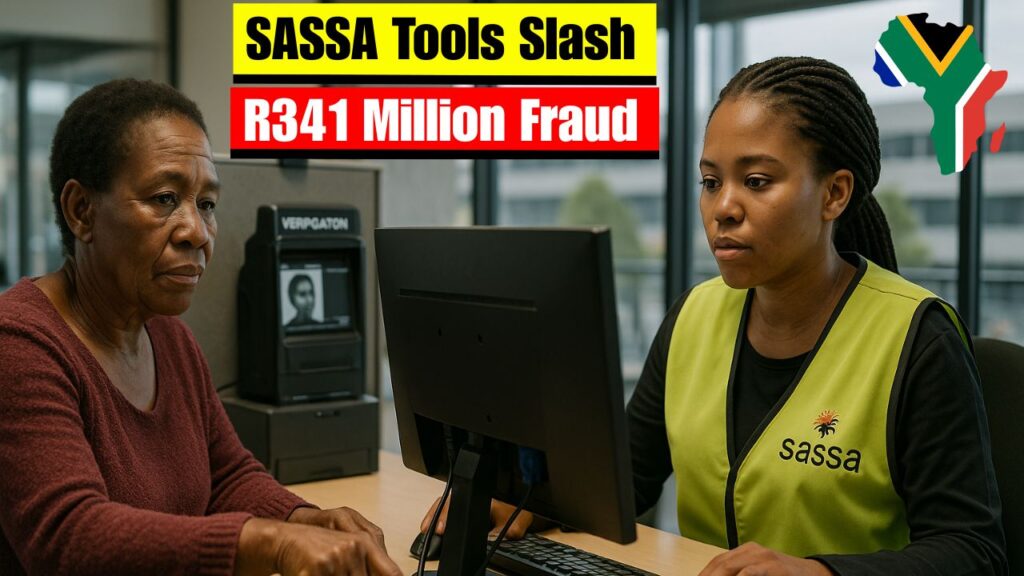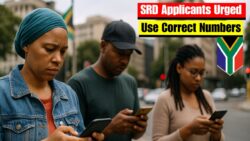The South African Social Security Agency (SASSA) expects to save R341-million next year following a major effort to stop fraud and remove grants from people who should not receive them. Officials say this cleanup is necessary to protect a welfare system that supports nearly 45% of South Africans. The savings come after SASSA cancelled about 35000 grants. Thousands more cases are still being checked as Treasury requires stricter income and asset verification. These new rules aim to fix a system that has long been seen as easy to exploit. SASSA is dealing with this cleanup while also facing problems with delayed payments & recipients not getting their money. The agency must also fight false information spreading online. Recent examples include rumors about double payments that went viral on social media.

Why SASSA’s 2026 Verification Upgrade Became Urgent
SASSA’s SRD and social grant platforms have experienced serious problems with identity theft and fake websites. The systems also suffer from weak encryption and security gaps that criminal groups have used to target vulnerable beneficiaries. Young people who have just turned 18 are especially at risk. A parliamentary investigation found major security weaknesses throughout the entire system. These findings have led to immediate reforms being put in place.
Acting CIO Jabulani Makondo Reveals How Deep the System Breach Went
We found over 150 websites that copy the SASSA SRD platform. People searching for SASSA find these fake sites instead. Users type in their ID number along with their name and banking details & home address. The scammers then take that information and use it to submit applications pretending to be those people. This statement comes from Jabulani Makondo who serves as Acting CIO at SASSA.
We have fixed the weak encryption that left applicants’ ID numbers and bank details exposed. The personal information sent to the SRD system is now properly protected according to Jabulani Makondo. The system had security flaws that put sensitive data at risk. Officials worked to strengthen the encryption methods used to safeguard personal details. These improvements ensure that information like identification numbers and banking information stays secure during transmission. Makondo confirmed that the necessary changes have been implemented. The updated security measures protect applicants throughout the entire process. Users can now submit their information with greater confidence that their private data remains safe from unauthorized access.
Social Development Minister Nokuzola Tolashe confirmed that the vulnerabilities were more serious than initially thought. The problems turned out to be worse than what officials had first believed. Minister Tolashe stated that the security weaknesses presented greater risks than the early assessments had shown.
The investigation discovered weak encryption and unauthorized application programming interfaces. It also found fraudulent websites that copied SASSA’s platform and caused payment disruptions. I want to assure you that SASSA has been working hard to protect the public resources that have been entrusted to us. This statement comes from Minister Nokuzola Tolashe who emphasized the agency’s commitment to security improvements. The findings revealed several security vulnerabilities that needed immediate attention. The weak encryption systems made it easier for unauthorized parties to access sensitive information
Breaking Down the Maths Behind the Projected R341 Million Fraud Savings
The Treasury’s new rules introduce stricter, more regular verification steps:
– Monthly reviews of earnings and financial activity
– Automated bank-account and credit-bureau cross-checks
– Detailed assessments of assets and personal holdings
– Mandatory verification right from the application stage
SASSA’s latest internal audit reveals major progress:
– 259,000 beneficiary reviews officially activated
– 201,000 assessments successfully completed so far
– 35,000 grants terminated after verification failures
– 8,600 grants reduced following income and eligibility checks
– R28.5 million saved every month through stricter controls
– R170.7 million already saved by the end of the financial year
– R341.4 million total savings projected for 2026 with new systems
Executive Manager Brenton van Vrede’s Full Briefing to Parliament Explained
SASSA expects to save R28.5-million each month from the cancelled grants. This amount will reach R170.7-million by the end of this financial year. After a full year the savings will total R341.4-million.
Van Vrede said that new Treasury conditions have made the workload much bigger. The Treasury has introduced additional requirements that staff members must now handle. This means employees have to complete more tasks than before.
Treasury now requires bank and credit bureau checks when people register. Our systems cannot currently perform these checks during the registration process.
We added a check to our bank verification process that only allows fully FICA compliant accounts to be verified. If an account does not meet full FICA requirements we will not transfer money into that account according to Van Vrede. The system now screens all accounts during the verification stage to confirm they have completed the FICA process. Any account that has not finished this compliance procedure will be blocked from receiving payments. This measure ensures that all transactions go only to properly verified accounts.
Inside the Tech Reinforcement: Fake Site Shutdowns, Encryption Boosts & Biometric Checks
SASSA confirmed that more than 70 out of over 150 fraudulent websites have already been shut down, and the agency is now rolling out a stronger five-layer security system that includes:
– Mandatory facial biometric verification for every SRD applicant
– Quarterly, high-level cybersecurity audits across all platforms
– A fully operational 24-hour security and monitoring centre
– Upgraded, advanced encryption standards to protect user data
– Newly improved authentication protocols to block fraud attempts
SASSA Security Improvements Show Results Moses Mbedhli who heads Internal Audit at SASSA explained that the organization has put strong security measures in place to prevent fraud. These new controls have made it much harder for criminals to tamper with the system. The results speak for themselves. Identity theft incidents have fallen dramatically. Last year SASSA recorded approximately 1100 cases of identity theft. However between April and September of this year that number dropped to around 500 cases. This significant reduction demonstrates that the security settings are working effectively.
Massive Database Audit: Thousands Flagged for Income, Duplicates & Multi-System Registrations
The government conducted verification checks with SARS UIF, GEPF, & the Department of Public Service and Administration. These checks revealed that fraud was happening on a large scale across multiple systems.
We found 161 recipients who appeared in both the bank records & credit bureau databases. Also we discovered over 2000 beneficiaries who worked for Cogta and most of them were hired through EPWP.
Another 6000 beneficiaries were found registered under Provincial Education and Labour databases. This discovery raises new questions about foster care system accuracy.
Acting CEO Zodwa Mvulane highlighted the seriousness:
Fraud had infiltrated the system deeply. These interventions are essential to prevent criminals from stealing from the poorest households Zodwa Mvulane serves as the Acting CEO of SASS. She explained that fraud had become a serious problem within the system. The organization needed to take action to protect vulnerable people. Criminal networks had found ways to exploit weaknesses in the payment system. They targeted benefits meant for the poorest families in the country.
Pending or Unpaid Grants? The New Steps Beneficiaries Must Follow in 2026
As verification reviews ramp up nationwide, over 12,000 SASSA grants were halted this month, mostly affecting applicants with:
– Outdated or inactive bank account details
– Incorrect ID numbers or mismatched surname records
– Missing or outdated income-related documents
– Review forms that were never submitted or completed
Grant Suspended? Here Are the Mandatory Actions SASSA Requires
– Check for any review or verification messages that SASSA may have sent you.
– Make sure to bring all your updated documents with you.
– You will need to visit a SASSA office in person to complete the review process.
– After you finish the verification, follow up right away since your payments will start again once everything is confirmed.
To find the latest payment dates you should check the official announcement for the most current schedule available.
SA Government’s Strategy: Securing Social Protection & Preparing Groundwork for Basic Income Support
Need Assistance? Reach Out to SASSA Directly
If your grant is unpaid or you still need to finish your review, contact SASSA through these official support channels:
General Contact Details:
– Toll-Free Helpline: 0800 60 10 11
– Official Website: www.sassa.gov.za
– Support Email: [email protected]
For SRD R350 Grant Support:
– Official SRD Status Check Portal → srd.sassa.gov.za
– SRD WhatsApp Helpline → 082 046 8553
– SASSA Online Services (Applications & Updates) → services.sassa.gov.za
General WhatsApp Support:
– WhatsApp Number: 082 054 0016
Pro Tip: SASSA se contact karte waqt apna ID number aur kisi bhi reference number ko ready rakhein — isse aapki verification jaldi ho jati hai aur help milti hai faster.
Final Outcome: R341 Million Recovered — But the Fraud Elimination Drive Continues
SASSA’s verification reforms are saving the state almost R30 million each month. The agency projects annual savings of R341 million once all fraudulent & ineligible grants are completely removed from the system. The new verification process identifies recipients who no longer qualify for assistance. This includes people whose financial circumstances have improved or who were receiving payments incorrectly. By removing these cases the government can redirect funds to those who genuinely need support. The reforms use updated technology to cross-check recipient information against various databases
Protecting Public Funds Through Modern Security Government officials continue to emphasize that the system faces ongoing threats. They stress that maintaining the safety of public funds requires several key measures working together consistently. Biometric verification systems must operate without interruption to confirm the identity of individuals accessing benefits and services. These systems use physical characteristics like fingerprints or facial recognition to prevent fraud & unauthorized access. Cybersecurity infrastructure needs regular updates to defend against evolving digital threats. Hackers and criminals constantly develop new methods to breach systems and steal public money.




